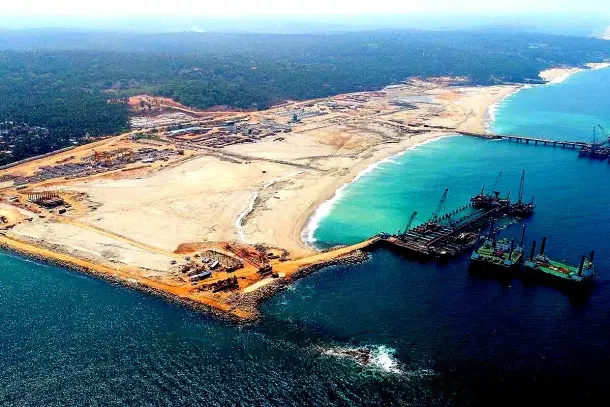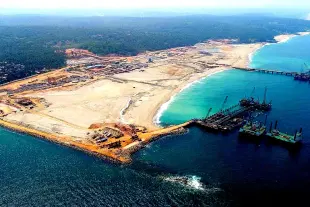News Brief
Vizhinjam Port Completion Advanced by 17 Years: Kerala-Adani Agreement Targets 2028
V Bhagya Subhashini
Nov 29, 2024, 07:26 PM | Updated 07:29 PM IST
Save & read from anywhere!
Bookmark stories for easy access on any device or the Swarajya app.


Adani Vizhinjam Port Pvt Ltd, a subsidiary of Adani Ports and Special Economic Zone Ltd (APSEZ), has signed a supplementary concession agreement with the Kerala government to expedite the development of the Vizhinjam Container Transshipment Port.
The revised timeline advances the project's second and final phase completion by 17 years, targeting 2028, unlocking an investment of Rs 10,000 crore over the next four years.
Chief Minister Pinarayi Vijayan and Port Minister V.N. Vasavan were present during the signing of the agreement. This move aims to establish Vizhinjam as a global transshipment hub with a capacity of 3 million twenty-foot equivalent units (TEUs).
Initially delayed by the pandemic and natural disasters, the project’s timeline was extended by five years. With the new agreement, APSEZ has committed to advancing capacity expansion by 2028 in exchange for resolving arbitration disputes and a five-year extension of the concession period to 2060.
The Kerala government also agreed to condone delays in completing the first phase, which is now set to conclude by December 2024. The first phase includes an 800-meter quay with a handling capacity of 8 lakh TEUs annually, reports India Today.
The Rs 7,700 crore project includes Rs 4,089 crore under a public-private partnership (PPP) model. The Vizhinjam port, the only port project to receive Viability Gap Funding (VGF), is backed by Rs 1,635 crore from the Union and Kerala governments.
The funding ensures economic viability while APSEZ is exempt from revenue sharing with the Kerala government for the first 15 years of operations.
Revenue sharing begins in the 16th year, starting at 1 per cent of gross revenue and increasing annually by 1 per cent until it reaches 40 per cent. Kerala will share 20 per cent of the premium collected with the Union government until the VGF is repaid.
Vizhinjam’s strategic location, deep-water capacity, and proximity to major shipping lanes position it as a competitive alternative to Colombo, the region's primary transshipment hub. The new port aims to bolster India’s trade capabilities while attracting global shipping traffic.
The agreement resolves past challenges and clears the way for additional funding agreements, including a tripartite deal between Adani Vizhinjam Port, lead banks, and the Department of Economic Affairs. Once operational, Vizhinjam is expected to revolutionize India's maritime trade, integrating Kerala into global trade networks.
"This agreement marks a transformative step in Kerala's maritime history, ensuring economic growth and enhanced global connectivity," said the Kerala government in a statement.
Vizhinjam is envisaged to be an all-weather, multipurpose, deepwater, mechanised, greenfield port that seeks to garner the lion's share of the Indian transhipment cargo now being handled by the nearby foreign ports and emerge as the future transhipment hub of the country.
Once launched, the port can serve approximately 120 million consumers across five major cities in South India— Chennai, Coimbatore, Bengaluru, Tirunelveli, and Thoothukudi — all within 18 to 24 hours by road or rail.
Additionally, once full operations commence and rail connectivity is established, the port will cater to another 220 million consumers in Hyderabad, Vizag, and Goa, cities reachable within 48 hours.
V Bhagya Subhashini is a staff writer at Swarajya. She tracks infrastructure developments.




